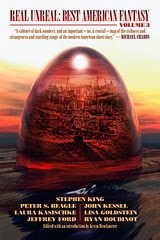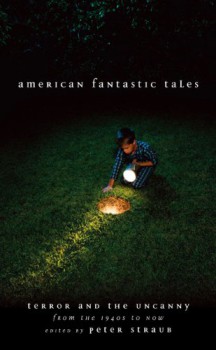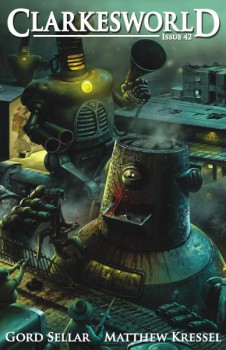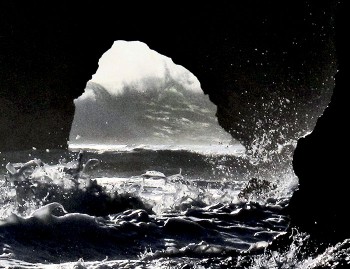Short Fiction Review #26: Real Unreal: Best American Fantasy Vol. 3
 I don’t know whether the third edition of Best American Fantasy, which has found a new home with Underland Press, represents the “best” fantasy, or why it matters whether it’s “American” (meaning, presumably, the United States). Of course, it’s a cliché for any anthology to proclaim its contents represent a “best of,” and the editors who’ve been doing it for a number of years frequently rely on stories from the usual suspects of authors who mostly all publish in the same magazines. While I haven’t read the previous editions of Best American Fantasy, knowing that the series editor is Matthew Cheney and the co-founding editors were Jeff and Ann VanderMeer, I knew what to expect from guest editor Kevin Brockmeier (notwithstanding that Stephen King is the top author listed on the cover page; indeed, his funny riff on the “mysterious telephone call from the dead,” is more in keeping with “traditional” fantasy). This is a collection of _____(New Weird, slipstream, literary, you fill-in-the-blank), the “Real Unreal” about the fantastical state of human consciousness. No elves or adolescents on a quest.
I don’t know whether the third edition of Best American Fantasy, which has found a new home with Underland Press, represents the “best” fantasy, or why it matters whether it’s “American” (meaning, presumably, the United States). Of course, it’s a cliché for any anthology to proclaim its contents represent a “best of,” and the editors who’ve been doing it for a number of years frequently rely on stories from the usual suspects of authors who mostly all publish in the same magazines. While I haven’t read the previous editions of Best American Fantasy, knowing that the series editor is Matthew Cheney and the co-founding editors were Jeff and Ann VanderMeer, I knew what to expect from guest editor Kevin Brockmeier (notwithstanding that Stephen King is the top author listed on the cover page; indeed, his funny riff on the “mysterious telephone call from the dead,” is more in keeping with “traditional” fantasy). This is a collection of _____(New Weird, slipstream, literary, you fill-in-the-blank), the “Real Unreal” about the fantastical state of human consciousness. No elves or adolescents on a quest.
What I didn’t quite expect was the number of authors totally new to me as well as the breadth of source materials, ranging from the tried-and-true (Fantasy and Science Fiction) to the literary (Kenyon Review) to another anthology (Del Rey Book of Science Fiction and Fantasy) to a few I’ve never heard of (The Fairy Tale Review, Pindeldyboz). And the only story I’d previously read was Jeffrey Ford’s “Daltharee,” about the creation of a bottled city and the arrogance and irresponsibility of scientific bureaucracies.
Ramona Ausubel sets the stage with the opening tale of “Safe Passage.” A group of grandmothers find themselves at sea, with no clue as to how they got onboard ship or why. Presumably, they’re dead. Okay, been there before. But the protagonist’s reaction to the banal behavior of her shipmates, and her ultimate decision to take action that results in a sort of enlightened view of her plight, makes the “unreal” here quite “real.”
…


 Over at
Over at  The latest issue of webzine
The latest issue of webzine  Here are the
Here are the  Some periodicals are closing, while others are resurrected. The latest revival is
Some periodicals are closing, while others are resurrected. The latest revival is